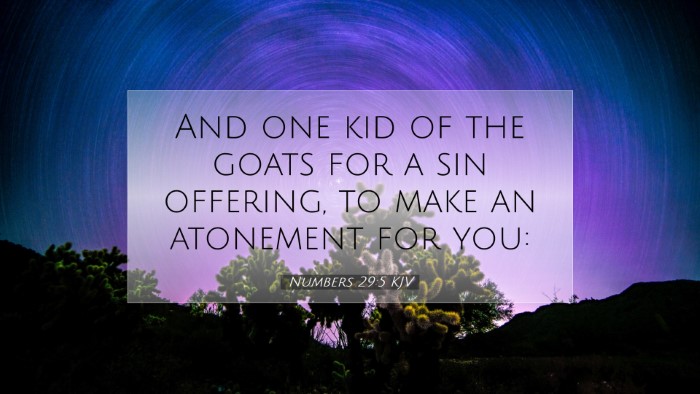Commentary on Numbers 29:5
Text of the Verse: "And you shall offer a burnt offering to the Lord, a sweet aroma, one young bull, one ram, and seven lambs in their first year; they shall be without blemish." (Numbers 29:5)
Overview
This verse is situated within the detailed instructions given to the Israelites regarding their sacrificial system as part of the Mosaic Law. It is part of the regulations for the Feast of Trumpets, which is significant in the Israelite liturgical calendar. The offerings described highlight the importance of worship, sacrifice, and the means through which the people sought to maintain their covenant relationship with God.
Matthew Henry's Insights
Matthew Henry emphasizes the importance of the offerings in their spiritual significance rather than merely their ritualistic nature. He indicates that the burnt offering is a symbol of total dedication to God, where nothing is withheld. The phrase "a sweet aroma" indicates that these offerings were pleasing to God, representing His acceptance of the worshippers’ devotion. Henry notes:
- The requirement for the offerings to be "without blemish" signifies God's demand for excellence in worship.
- The inclusion of various animals (a bull, a ram, and lambs) reflects the diverse nature of sacrifices, which catered to different socio-economic backgrounds among the Israelites.
- This offering was not just a duty but an act of worship, encompassing gratitude, acknowledgment of God’s provision, and a plea for favor.
Albert Barnes' Commentary
Albert Barnes elucidates on the cultural and theological implications of the offerings. He underscores that:
- The burnt offerings were central to ancient Israel's sacrificial system, representing a complete surrender to God.
- Barnes points out that the offering of a bull, ram, and lambs illustrates not only wealth but also variety in the sacrificial acts, indicating that worship should come from the heart and according to one's ability.
- In the context of community worship, these sacrifices served as collective expressions of faith, reinforcing the unity and identity of the Israelites as the people of God.
Further, he reflects on the nature of the "sweet aroma" as a metaphor for God's pleasure with offerings that are made with sincere hearts.
Adam Clarke's Analysis
Adam Clarke, in his extensive work, contextualizes Numbers 29:5 within the greater framework of Israelite worship. His insights include:
- Clarke provides a detailed explanation of the types of offerings delineated in this verse, suggesting that each animal plays a role in expressing specific dimensions of worship and atonement.
- He emphasizes that the meticulous nature of the sacrificial system served as a paradigm for approaching God's holiness, illustrating the seriousness with which worship must be approached.
- Additionally, Clarke suggests that the offerings, particularly during significant feasts like the Feast of Trumpets, symbolize the need for communal repentance and restoration before God.
Theological Reflections
This verse invites several theological reflections that resonate across generations:
- Holiness of God: The requirement for unblemished offerings underscores God's absolute holiness and the need for purity in worship.
- Identity and Community: Offering together as a community reinforces not only the individual’s devotion but also the shared faith of the Israelites as a covenant community.
- Symbolism of Sacrifice: The sacrifices pointed toward the ultimate sacrifice of Christ, serving as a foreshadowing of redemption and atonement for sin.
- Worship as a Priority: The emphasis on regular offerings suggests that worship is not an afterthought; it shapes the spiritual life of the community.
Conclusion
Numbers 29:5 encapsulates profound truths about worship and sacrifice within the Israelite tradition. The insights gleaned from Matthew Henry, Albert Barnes, and Adam Clarke enrich our understanding of the importance of sincere worship and highlight how such practices reflect a broader theological narrative. These offerings signify more than mere acts of ritual; they embody the heart of devotion that believers in every age are called to embody.


